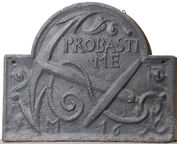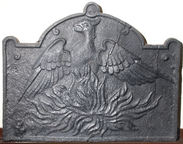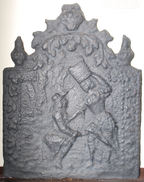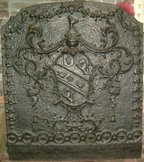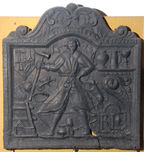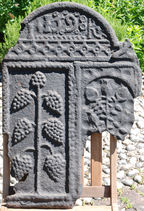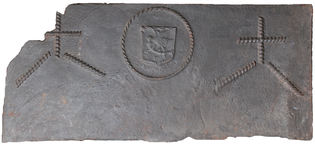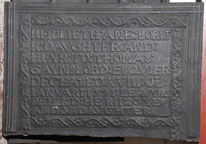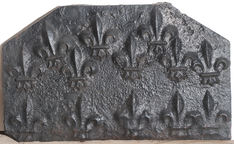-
408
Description: Arched rectangular shape; cavetto moulded edge all round; holes pierced in top corners; a fouled anchor with one fluke resting on the base, a scroll below each top corner, foliage above the text, which is above the anchor; the initials either side of the lower fluke.
Notes: The inscription is a quotation from Psalms 139, v. 1: ‘Domine, probasti me et cognovisti me’ (Lord, thou hast searched me and known me).
Copies of this fireback are known.
Inscription: PROBASTI / ME / I M 16 5[0?]
- Decoration tags:
- rectangular with round arch (shape)
- cavetto (edging)
- whole carved pattern
- individual numbers
- planklines
- pictorial
- biblical
- text
- objects
Manufactured: in the mid-17th century possibly at Brede Furnace in the Weald area of England.
Current location: Anne of Cleves House, Southover High Street, Lewes, East Sussex, England.
Museum number: LH000.908 (part of the Sussex Archaeological Society museum group)
Citation: Dawson, C., 1903, 'Sussex Iron Work and Pottery', Sussex Archaeological Collections, 46, pp. 1-54.
-
409
Description: Quasi-arched rectangular shape, semi-circular protrusions on top corners; circular loop at top of arch; fillet edging with small twists inside arch, and curls inside and below top corners; a phoenix in flames, its wings displayed and inverted.
Notes: The use of the loop in the edging draws comparisons with other firebacks, and may indicate the same source. Formerly part of the J. H. Every collection.
- Decoration tags:
- rectangular with round arch (shape)
- fillet (edging)
- whole carved pattern
- planklines
- pictorial
- mythological
- animals
Manufactured: in the mid- to late-17th century possibly in the Weald area of England.
Current location: Anne of Cleves House, Southover High Street, Lewes, e, England.
Museum number: 1944.24.061 (part of the Sussex Archaeological Society museum group)
- Attached to series:
- Loop edged firebacks
- Phoenix firebacks
-
417
Description: Rectangular central panel with top arch, bead edging; pictorial scene of a a kneeling man in a wide-brimmed hat reaching up the skirt of a milk maid, who in fending him off, leans forward, tipping the milk from the bucket on her head over the man; acanthus leaves over the top arch; side border with bead edging extending over shoulders of plate, surmounted by a floral vase each side; on top a floral vase between leaves.
Notes: Inscription on the back of the casting: 'Made from a casting lent to J. H. E[very] by Mr J. T. Ade of Hellingly'.
Copies of this fireback are known.
- Decoration tags:
- 'Dutch' (shape)
- bead (edging)
- whole carved pattern
- pictorial
- humans
Manufactured: in the early-18th century in England.
Current location: Anne of Cleves House, Southover High Street, Lewes, East Sussex, England.
Museum number: 1944.24.081 (part of the Sussex Archaeological Society museum group)
Citation: Lloyd, N., 1925, 'Domestic Ironwork I', Architectural Review, 58, pp. 58-67.
- Attached to series:
- Miscellaneous pattern firebacks
-
428
Description: Rectangular, with low curved top and stepped concave corners; suspended floral-chain border on top and sides; alternate small and large rings along the bottom; plain panel at base. Arms of Webster, baronet, of Battle: Azure, on a bend argent, cotised Or, between two demi-lions ermine, a rose gules, barbed and seeded proper, between two boars’ heads couped sable.
Notes: Sir Thomas Webster was created baronet in 1703; he was succeeded by his son, Whistler, in 1750. A pair of matching, cast-iron side plates form a set with this fireback.
Copies of this fireback are known.
Arms: Webster of Battle
- Decoration tags:
- rectangular with canted top corners and round arch (shape)
- none (edging)
- whole carved pattern
- armorial
Manufactured: in the early-18th century possibly at Robertsbridge Furnace, Salehurst in the Weald area of England.
Current location: Barbican House, High Street, Lewes, East Sussex, England.
Museum number: 39.52/LH000.986 (part of the Sussex Archaeological Society museum group)
- Attached to series:
- Personal armorial firebacks
-
429
Description: Arched rectangular shape with symmetrical floral scrolls on top; three horizontal plank lines; ovolo moulding all round edge of main panel; inscription along top edge of panel; central figure of a bearded man wearing knee-length coat, belted at waist, and holding a sledge hammer in his right hand, his left arm akimbo; both feet pointing to his right; various ‘tools’ of his trade arranged about him; (clockwise from top left) shield, the quarters containing a masonry hammer, a firedog, a weight, and a pair of pincers; the date split on either side of his head; a floral console supporting a shelf bearing a flagon, a tankard and a goblet; a fireback bearing the letters RL and a diamond shape; from the top of the fireback a dog leaping up at its master; between the man's legs a long-handled ladle, a weight and a cooking pot; a ringer, used to pull slag off molten iron; part of the elevation of a blast furnace, with wooden framework, casting house, and flames issuing from the top; an ore basket, wheelbarrow and a charcoal clamp
Notes: The 'Lenard' fireback; a much-copied plate. Items relating to the founder's working life are displayed to the left of the figure, those to the right reflecting his domestic life. Its individualistic design and naïve figuration are the key to identifying a distinct group of firebacks, all probably made at Brede. A pastiche of this fireback also exists (no. 668), with which it is sometimes confused. Inferior copies of this fireback were advertised in Kings Worthy Foundry's (Winchester) catalogue in the mid-20th century.
Copies of this fireback are known.
Inscription: RICHARD LENARD FOVNDER AT BRED FOVRNIS [each D is reversed] / 1636 / RL
- Decoration tags:
- rectangular with round arch (shape)
- ovolo (edging)
- whole carved pattern
- planklines
- pictorial
- historical
- text
- animals
- humans
- objects
Manufactured: in 1636 at Brede Furnace in the Weald area of England.
Current location: Anne of Cleves House, Southover High Street, Lewes, East Sussex, England.
Museum number: LH000.906 (part of the Sussex Archaeological Society museum group)
Citation: Anon., 30 Dec 1911, 'Sussex Backs and their Story', The Ironmonger.
Citation: Dawson, C., 1903, 'Sussex Iron Work and Pottery', Sussex Archaeological Collections, 46, pp. 1-54.
Citation: Gardner, J. S., 1898, 'Iron Casting in the Weald', Archaeologia, 56, 1, pp. 133-164.
- Attached to series:
- Brede group
- Personal firebacks
-
430
Description: Fragment; to the left, rectangular panel with braid edging, vine standard with six bunches of grapes and a cluster at the top; to the right, rectangular panel with wide fillet edging, arched recess with three flower heads in low relief, and in the arch spandrels four 'bullseye' motifs comprising concentric rings deepening towards the centre; on top, a semi-circular panel with fillet edging, within which are the date between the initials, with scattered small rings, below is a pattern of eight linked circles; vestige of another semi-circular panel to the left.
Notes: Potentially a fragment of a large fireback, the vestige of a second semi-circular arched panel on top offers the possibility that several other panels originally existed further to the right. The two surviving panels combine elements from two separate sub-groups of firebacks that were moulded from individual, interchangeable panels, indicating that the sub-groups originated from a common source.
Inscription: I 1598 R
- Decoration tags:
- rectangular with round arch (shape)
- astragal (edging)
- carved pattern panels
- text
- plants
Manufactured: in 1598 in the Weald area of England.
Current location: Anne of Cleves House, Southover High Street, Lewes, East Sussex, England.
Museum number: 1944.24.083 (part of the Sussex Archaeological Society museum group)
- Attached to series:
- Armada series
-
435
Description: Rectangular (damaged top left corner); plain plate; centre top, a circle of twisted rope enclosing a shield, indented at the top, charged with a bird upon a branch; on each side, a cross of twisted rope above two splayed lengths of rope.
Notes: The rope design is likely to be apotropaic; the heavily pitted reverse of this fireback shows the use of poor quality iron cast at a relatively low temperature; the bird shield stamp has been seen on other firebacks.
- Decoration tags:
- rectangular (shape)
- none (edging)
- simple stamps
- carved stamps
- apotropaic
- armorial
- objects
Manufactured: in the early- to mid-16th century in the Weald area of England.
Current location: Anne of Cleves House, Southover High Street, Lewes, East Sussex, England.
(part of the Sussex Archaeological Society museum group)
- Attached to series:
- Bird shield series
- Rope design firebacks
-
436
Description: Rectangular; carved moulding edging; centre, inscription panel; undulating vine strip stamp repeated thirteen times to form an inner border along each side of the inscription panel.
Notes: The only fireback of the Anne Forster series to have edging formed from wooden moulding probably from dismantled furniture or panelling. Given to the Sussex Archaeological Society in 1850 by Sir Henry Shiffner Bt., of Coombe Place, Hamsey, Sussex. A former occupant of his burnt-out estate cottage, where it had been found, was said to have been a Miss Forster.
Inscription: HER:LIETH:ANE:FORST / R:DAVGHTER:AND: / HEYR:TO:THOMAS: / GAYNSFORD:ESQVIER / DECEASED:XVIII:OF: / IANVARI:1591:LEAVYNG / BEHIND:HER:II:SONES: / AND:V:DAVGHTERS
- Decoration tags:
- rectangular (shape)
- complex individual (edging)
- simple stamps
- carved pattern panels
- planklines
- text
Manufactured: in the late-16th century possibly at Pounsley Furnace, Framfield in the Weald area of England.
Current location: Anne of Cleves House, Southover High Street, Lewes, East Sussex, England.
(part of the Sussex Archaeological Society museum group)
Citation: Dawson, C., 1903, 'Sussex Iron Work and Pottery', Sussex Archaeological Collections, 46, pp. 1-54.
-
441
Description: Sub-rectangular; edged with a repeated length of helically-turned dowel (top and sides); apparently random arrangement of same piece of dowel repeated ten times, including a saltire and cross.
Notes: Apart from the Christian significance of the cross, the other arrangements of rope lengths may be apotropaic in their purpose, the double V being a possible invocation of the Virgin. The blemishes at the base are caused by the casting sand being disturbed by the pouring of the metal.
- Decoration tags:
- rectangular (shape)
- rope (edging)
- simple stamps
- apotropaic
- objects
Manufactured: in the 16th century in the Weald area of England.
Current location: Anne of Cleves House, Southover High Street, Lewes, East Sussex, England.
Museum number: LH000.799 (part of the Sussex Archaeological Society museum group)
Citation: Dawson, C., 1903, 'Sussex Iron Work and Pottery', Sussex Archaeological Collections, 46, pp. 1-54.
Citation: Gardner, J. S., 1898, 'Iron Casting in the Weald', Archaeologia, 56, 1, pp. 133-164.
- Attached to series:
- Rope design firebacks
-
443
Description: Canted rectangle; plain plate with two rows of fleurs de lys, eight in the top row, three off set above the other five, and five in a single row along the bottom.
Notes: The fleurs-de-lys are the same as are seen on firebacks thought to have been cast at Pounsley.
- Decoration tags:
- rectangular with canted top corners (shape)
- none (edging)
- carved stamps
- heraldic
Manufactured: in the mid- to late-16th century possibly at Pounsley Furnace, Framfield in the Weald area of England.
Current location: Anne of Cleves House, Southover High Street, Lewes, East Sussex, England.
(part of the Sussex Archaeological Society museum group)
Citation: Butterfield, W. R., 1916, 'Old Wealden Firebacks', The Connoisseur, 46, pp. 197-209.
- Attached to series:
- Pounsley series
